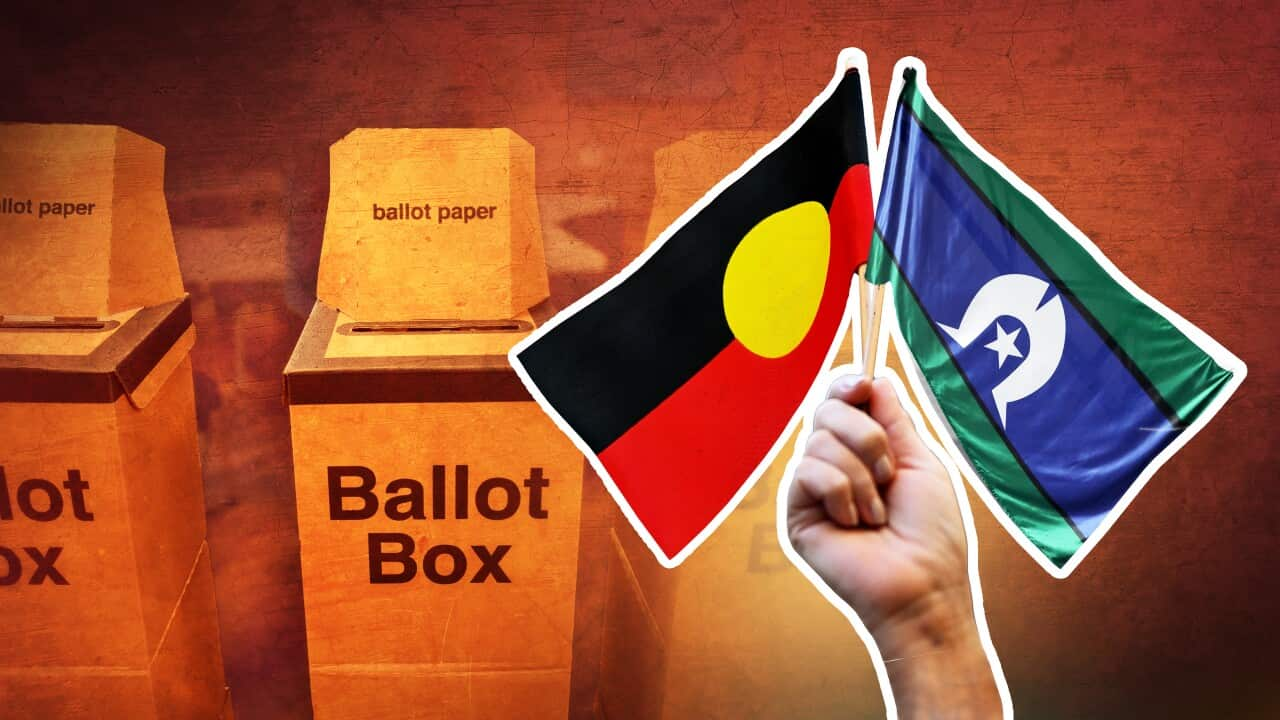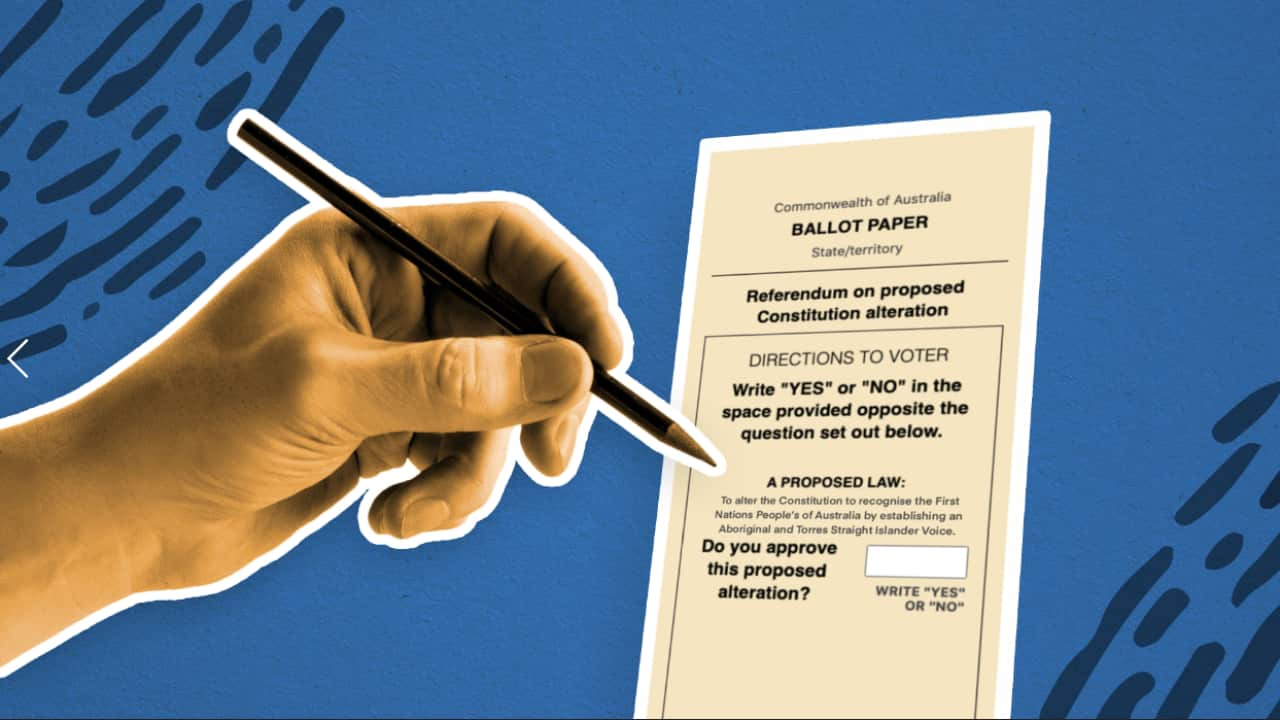For many Aboriginal and Torres Strait Islander people, the road to the Indigenous Voice to Parliament referendum has been a long - and at times, burdensome - one.
Prime Minister Anthony Albanese has leaving around six weeks until the vote.
Indigenous academics, experts and campaigners say there are different ways non-Indigenous people can be respectful allies in the lead-up to the referendum and beyond.
Indigenous Australians facing a 'heavy burden'
James Blackwell, a Wiradyuri man and research fellow in Indigenous diplomacy at Australian National University, said there is a "massive" cultural load on Indigenous Elders and communities.
"Australians want to hear from Indigenous people," he told SBS News, acknowledging this often "comes from a good place".
"But that does mean we're under a lot of pressure to speak, to give opinion on the Voice, and sometimes that strays into over-burdening that we see a lot of people getting."
Melinda Cilento, co-chair of peak reconciliation body Reconciliation Australia, said these impacts come on top of the load Indigenous people always carry "in explaining the culture, history and place of First Nations people in our society".
"The referendum has just heightened that," she said.
Kate Russell is an Awabakal woman and Chair of Diversity Council Australia’s Aboriginal and/or Torres Strait Islander External Advisory Panel. She said this cultural load is not being talked about enough.
"I think that’s a shame, because it’s something Indigenous people are carrying, regardless of where they stand," she said.
"Having good allies is always integral. But we can’t do this without our allies."
What does allyship mean?
Blackwell said it is important to support Indigenous people through this time, regardless of how they are voting in the referendum.
As a supporter of the Voice, he says allyship can also involve advocating for a Yes, adding in his view, "because it is something our mob overwhelmingly want".
But not all Indigenous people have the same view.
Em Randall, a Yaegl woman and member of the Black Peoples Union which , agreed allyship can mean support for one's cause and for all First Nations people. "It can be both," she said. The Black Peoples Union are calling for a treaty first, and don't feel the proposed Voice to Parliament goes far enough.
"Allyship for me means not taking up space, but standing with us and actually listening to what we have to say."
Blackwell referred to , a Yorta Yorta woman and University of Wollongong academic, who distinguishes between allies and "accomplices".
"She says it’s not just about being an ally, but it’s about being an accomplice - working with us, standing with us, and allowing us to define the issue and the required action," he said.
Traditionally, Russell said allyship has involved creating space for people with lived experience - and not making decisions or speaking for them.
"A referendum is asking the non-Indigenous majority to make decisions on behalf and for an Indigenous minority, and that can be very uncomfortable for an ally," she said.
"But we need our allies now more than we do ever. This is a statistical game ... representing three per cent of the population, we need our allies to get educated, get informed."
Have a conversation
For Russell, the most important way to be a good ally is to "have a yarn".
"Have a conversation - whether it’s at home, at work, on the street. Don’t underestimate the power of having a friendly, open conversation," she said.
"Respect difference, listen to the diverse voices on this. That’s how allies can have a meaningful, intergenerational, tangible impact on not only the Indigenous community, but the Australian community."
Understand and 'elevate' Indigenous perspectives
Cilento said allyship is not just about standing alongside First Nations people, but elevating their knowledge and perspectives. This starts by understanding them.
"A good ally thinks about, reflects on, and understands what colonisation has meant throughout centuries, in our most recent decades and what impact that has had on Aboriginal and Torres Strait Islander people," she said.
"They understand that and they try to put themselves in the shoes of First Nations people to understand where they’re coming from and what this means for them.
"Then they prioritise the perspectives of Aboriginal and Torres Strait Islander people, and work to advance their perspectives."
Listen to different voices
Indigenous people are not homogenous and like any community have diverse views, said Russell, a Yes campaigner.
"There are voices, loud and soft, on both sides of the debate," she said. "I have total respect for all of those voices."
She encouraged people to listen to them.
Cilento agreed. "We don’t assume all non-Indigenous Australians have the same views and perspectives. It’s about educating and informing yourself about different perspectives," she said.
"All of this is about respectful conversations, and learning and seeking to understand the perspectives of Aboriginal and Torres Strait Islander people. That’s the first and foremost thing that we have to do as allies and accomplices in this conversation."
Randall said it is important for allies to recognise the "difficult position Blackfellas are under".
"We aren't a monolith; we don't all have the same opinions on everything. But because we're only three per cent of the population, even if we all agreed, sadly, our vote won't make much of a difference," she said.
"No one can tell you how to vote. They [allies] need to understand the weight that their vote has."
Allow people to create their own space
For Blackwell, being an ally or accomplice means giving Indigenous people space - and not demanding information and emotion from them at all times.
"Don't ask every Indigenous person about the referendum every time you see them. Don’t presume that just because we’re Indigenous we have a view - or want to take a view publicly," Blackwell said.
"Not every Indigenous person will want to speak to this issue."
Blackwell is publicly involved in the debate but acknowledges others are not in the same position.
"It’s about being mindful that for some of us, we don’t want to engage at all. For some of us, there will be certain times when we want to engage," he said.
Randall agreed it's important not to assume that every Indigenous person will want to engage in conversations about the Voice.
"It’s very difficult to be put on the spot and be expected to educate everyone," she said.
She suggested looking out for certain organisations or individuals who have information on their social media accounts.
"It’s important that when Blackfellas do put out information that you listen and take it in. But don’t expect every Blackfella to be giving you information. Look out for where the information is."
Blackwell also encouraged allies and accomplices to consider where they can help to ease the burden on Indigenous people.
"How can we best support our friends, colleagues, fellow Indigenous people to get through this period? What aspects of our lives do we need help with?" he said.
"Regardless of if we’re actively engaging, just remember it’s been a long couple of years with this, it’s going to be a long [few] months. We are all really tired."
As the referendum date draws closer, Randall said it has been "wonderful to see Blackfellas reaching out to each other [on Instagram], sharing mental health resources and giving opportunity to yarn".
"There is life after the referendum. We need to start to turn around and see how we can create that solidarity again after this referendum and come back together as a community."
For culturally safe First Nations crisis support, you can give a call on 13 92 76. They offer a free, confidential one-on-one yarning opportunity with an Aboriginal and/or Torres Strait Islander Crisis Supporter, 24 hours a day, 7 days a week.
Stay informed on the 2023 Indigenous Voice to Parliament referendum from across the SBS Network, including First Nations perspectives through NITV.
Visit the to access articles, videos and podcasts in over 60 languages, or stream the latest news and analysis, docos and entertainment for free, at the .











